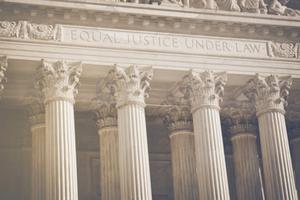Music For the Soul: Composing for the Human Dignity of the Homeless
COMMENTARY: The Nov. 6 Solemn Requiem Mass for the Homeless in San Francisco will make real the equal dignity of every soul.

Last January, after a Nigerian immigrant named Edwin froze to death, alone, just outside St. Peter’s Basilica, Pope Francis sorrowfully observed that the man had been “abandoned, by us as well,” and asked his flock to “pray for him.”
At that time, I was already working on the music for a new Solemn Requiem Mass for the Homeless, at the request of Archbishop Salvatore Cordileone. And on Nov. 6 at 10am at the Cathedral of Mary of the Assumption in San Francisco, I will join hundreds of Californians to pray for the souls of all those who have died on the streets of San Francisco and beyond.
Devising effective policies to best help homeless people on the streets is very important work, but it is not the work of an artist. What I know deep in my bones is that any such set of policies must be grounded in something larger than a utilitarian calculus; it must rest ultimately in a special kind of faith: faith in the equal dignity of every human life.
To see this human dignity requires reaching beyond the material world to the world of the spirit. This is the artist’s calling. In the natural world, some people appear more valuable than others: some people really are stronger, faster, smarter, healthier, more beautiful, more generous, or more productive than others.
We must make the effort to see human beings with God’s eyes if we are to recognize our essential equality and our irreducible dignity as his children.
The period of contemplation-gestation for this Requiem Mass was far more challenging than with any work I’d done before. I spent time getting to know some of the homeless people I’d previously just passed by as I walked the streets. And as I engaged in a prolonged interior dialogue, I kept a kind of diary.
Here are some of the notes to myself I wrote as I prepared to work on the Requiem. They are, perhaps, not especially original, but I needed to steep myself in these realities again and again.
• Music that befits not how we in the world see the homeless — but how God sees them. Each soul as precious and beloved and exalted as that of any king or queen, each soul of equal dignity and worthy of being commemorated in that way. Music not for their bodies, but for their souls.
• The deepest need of homeless people, like the rest of us, is not simply shelter, but a home — and that ultimate home is the Church, and their nourishment, the sacraments.
Archbishop Cordileone asked me to try to evoke musically the experience of being homeless on the streets: perhaps a soundscape of life on the street? An intriguing idea, yet one that presented a daunting challenge for me within the context of liturgical music.
Sacred music, to be worthy of the liturgy, must embody the qualities of sanctity, beauty and universality as Pope Pius X taught us — all three, not some subset, but all three. Any music that might unduly emphasize particular cultural or secular elements poses the danger of casting a shadow over this quality of ‘universality’.
Consequently, I saw no way to produce music evoking “life on the streets” without transgressing one or more of the three cardinal qualities of worthy liturgical music.
I resolved this tension with a seven-minute-long post-Communion meditation, O Vos Omnes. It is an extra-liturgical Epilogue that explores ground that people familiar with my sacred music are probably not expecting. The purpose of this pressing of musical boundaries is to communicate the depth and intensity of the suffering of the homeless — to give a voice to the range of emotions they experience, from astonishment at people’s indifference, anger at their circumstances, grief, and a kind of inner pleading for compassion — all in a volatile mix, all in the first-person singular. This is the moment in the Requiem where the homeless are given a voice.
The text of the meditation is in Latin. It is an abbreviated form of Lamentations 1:12, written after the Babylonian destruction of Jerusalem in 586 B.C., at a time when there were people living on the streets, homeless and bereft:
O vos omnes qui transitis per viam,
adtendite et videte si est dolor sicut dolor meus
quoniam vindemiavit me.
O all you who pass by on the street,
look and see if there be any misery like unto the misery
that has befallen me.
As we gather to pay our respects to the dead, in the traditional month for doing so, I hope and pray this lamentation will speak for those who can no longer speak and that the Requiem Mass for the Homeless will make real for all of us the equal dignity of every soul.
Frank La Rocca is the composer-in-residence at The Benedict XVI Institute for Sacred Liturgy and Music and composer of The Mass of the Americas.
More Information: The Nov. 6 Requiem Mass will be livestreamed at BenedictInstitute.org.
- Keywords:
- homelessness
- mass
- sacred music
- archbishop salvatore cordileone
- archdiocese of san francisco














